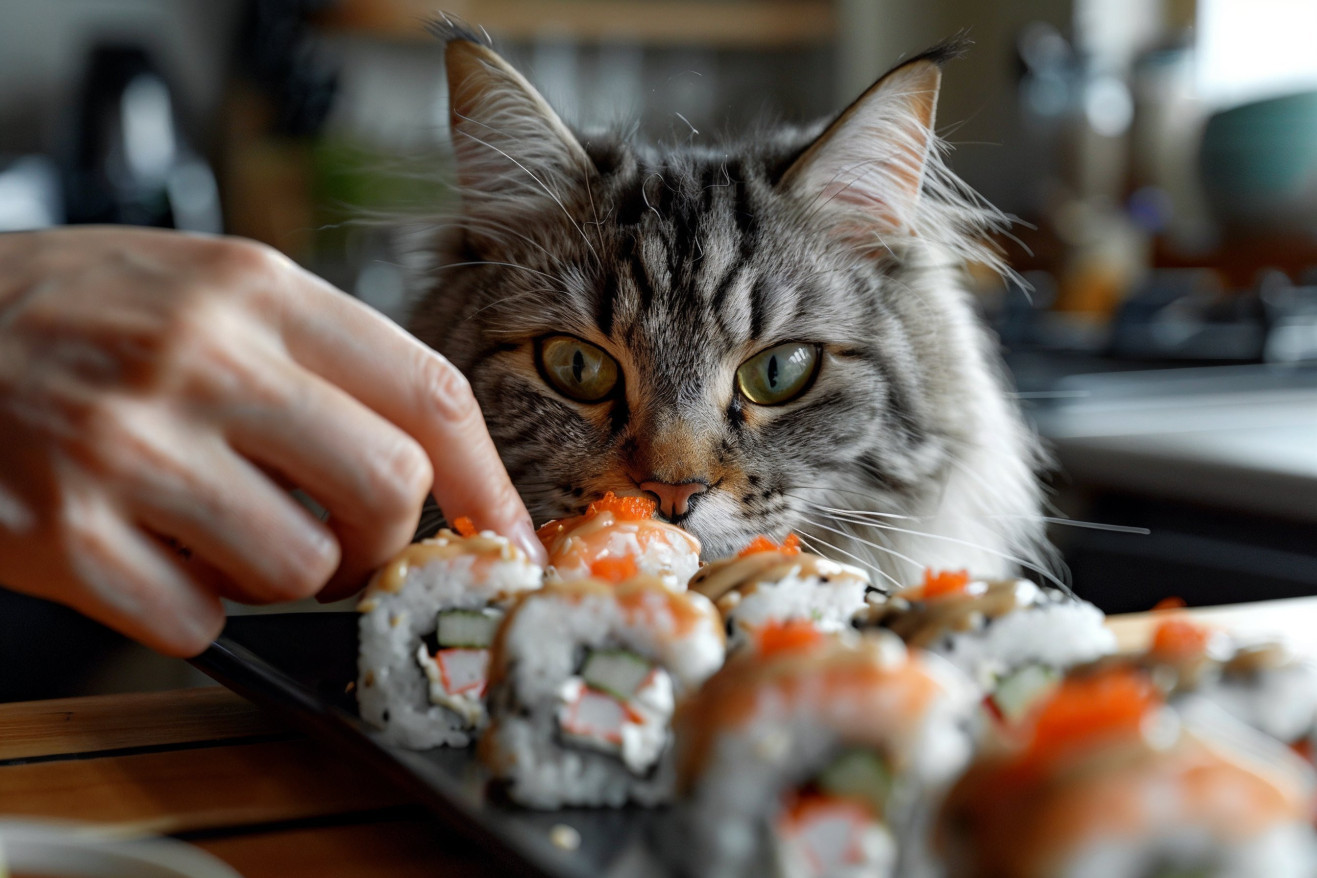Can Cats Eat Sushi? Here's What the Studies Say
11 June 2024 • Updated 10 June 2024

If you're a cat parent who loves sushi, you may have wondered whether or not you can give your feline friend a taste of your favorite sushi rolls. While plain cooked fish can make a good occasional treat for cats, sushi is generally not recommended because of the potential dangers of raw fish, rice, vegetables, seasonings, and other sushi ingredients that can be harmful to cats.
In this article, we'll look at this issue in depth by reviewing studies by veterinary nutrition researchers that examine the risks that various sushi ingredients pose to cats. This includes a discussion of the dangers of raw fish parasites, the digestive problems that can be caused by rice and vegetables, and the potential hazards of the seasonings and condiments that are often used in sushi. By the end of this article, you'll understand why traditional sushi isn't the best choice for your cat and know how to make safe sushi-like treats for your cat at home.
Can cats eat sushi?
Raw Fish Can Be Dangerous for Cats
Raw fish, which is commonly used in sushi, can be dangerous for cats for a number of reasons. First, raw fish contains the enzyme thiaminase which, as noted by Litter Robot, breaks down thiamine (vitamin B1) and can cause a thiamine deficiency in cats that can be life-threatening. A source cited by PetHonesty also warns that raw fish can contain harmful bacteria like salmonella and E. coli, which can cause bacterial food poisoning.
In addition, as explained by PetMD, bacterial food poisoning caused by bacteria like listeria can cause vomiting, depression, fever, and in severe cases, facial paralysis or spontaneous abortion. Raw fish can also contain parasites like tapeworms or roundworms, which can infect cats and cause health problems if they eat them.
Although cats may love the smell and taste of raw fish, the risks of thiamine deficiency, bacterial food poisoning, and parasitic infections make it a bad choice for cats. It’s best to avoid feeding raw fish to cats to protect their health and well-being.
Cooked Fish: A Better Option for Cat Treats
While raw fish is best avoided, cooked fish can be a safe and nutritious treat for cats if it's prepared correctly. Purina notes that cooked fish is a good source of essential nutrients, including high-quality protein, omega-3 fatty acids, and vitamins that are important for a cat's well-being. In particular, oily fish such as salmon, mackerel, and sardines are high in omega-3 fatty acids, which Hill's Pet Nutrition says are important for cats' brain development, vision, and joint health.
To make sure that fish is safe for cats to eat, Bella & Duke says it should be cooked thoroughly and free from any seasonings, oils, or salt, and all bones should be removed. Catster adds that it's important to feed cats fish in moderation because if they eat too much, it can throw off their nutritional balance and lead to nutritional deficiencies or obesity.
Shrimp and Shellfish: Healthy Seafood Snacks for Cats?
If prepared properly, cooked shrimp and other shellfish can be a healthy and safe snack for cats. Healthy Paws Pet Insurance explains that shrimp is a great source of protein, antioxidants, and essential nutrients like iodine, which can benefit a cat's health. However, Fetch Pet warns that shrimp must be deveined, peeled, and cooked without any seasonings, oils, or salt before it can be given to cats.
Shrimp should be fed in moderation, as Perfect Petzzz points out that overeating shrimp can lead to digestive upset and nutritional imbalances in cats. In addition, Fetch Pet says that cats with certain health issues, like hyperthyroidism, may need to avoid shrimp because of its high iodine content. Always make sure to prepare and serve shrimp in moderation if you want to give it to your cat as an occasional treat.
Dealing With Accidental Sushi Consumption and Food Poisoning
If a cat eats sushi or raw fish, it’s important to watch for any signs of digestive issues or food poisoning. Spot notes that common symptoms of food poisoning in cats include vomiting, diarrhea, lethargy, fever, and loss of appetite. If any of these symptoms occur after a cat eats sushi or raw fish, PetMD says that you should contact a vet immediately and let them know what the cat ate.
Don’t try to treat the cat at home, as food poisoning in cats can require medical intervention, including things like fluids, antibiotics, and anti-nausea drugs. The best way to deal with this issue is to prevent it from happening in the first place. Spot suggests making sure that sushi and raw fish are stored in a way that keeps cats from getting into them. By taking these steps, cat owners can make sure that their pets are protected from the potential risks of eating sushi.
Safe Sushi Alternatives and Treats for Cats
If you want to share sushi with your cat, but don't want to risk the potential health issues associated with raw fish, there are some alternatives that you can make at home. NextGenPaws Pet Portraits recommends making 'cat-safe sushi' with cooked fish, plain rice, and cat-friendly ingredients like shredded carrots or cucumber.
In addition, Purina and PetMD list other human foods that are safe for cats to eat as occasional treats, including cooked chicken, turkey, eggs, and small amounts of vegetables. However, Cats Luv Us notes that commercial cat treats and high-quality wet or dry cat foods are the best way to ensure cats get a balanced and complete diet.
It's important to talk to a vet before giving cats new foods or homemade treats, as Cats Luv Us points out. However, with the right precautions and advice, cat owners can give cats some human foods as occasional treats without negatively impacting their cat's health and nutritional needs.
Conclusion: Making Sure Your Cat Is Healthy and Well-Nourished
Even though the smell and taste of sushi may make it seem like a great option for your cat, most traditional sushi dishes are not safe or healthy for cats. Raw fish, which is a staple ingredient in sushi, can lead to a number of health problems in cats, including thiamine deficiency, bacterial infections, and parasitic infestations. On the other hand, cooked fish and shellfish can be a healthy and safe occasional treat for cats if it's prepared correctly and given in moderation.
If you want to make 'sushi' for your cat, you can do so by using the right ingredients and making it at home. This will help ensure that your cat can enjoy the treat without any risk to their health. However, it's important to remember that while it's okay to give your cat human food and treats from time to time, you should always do so under the guidance of your veterinarian and make sure that your cat's diet is based on a balanced and complete commercial cat food.


